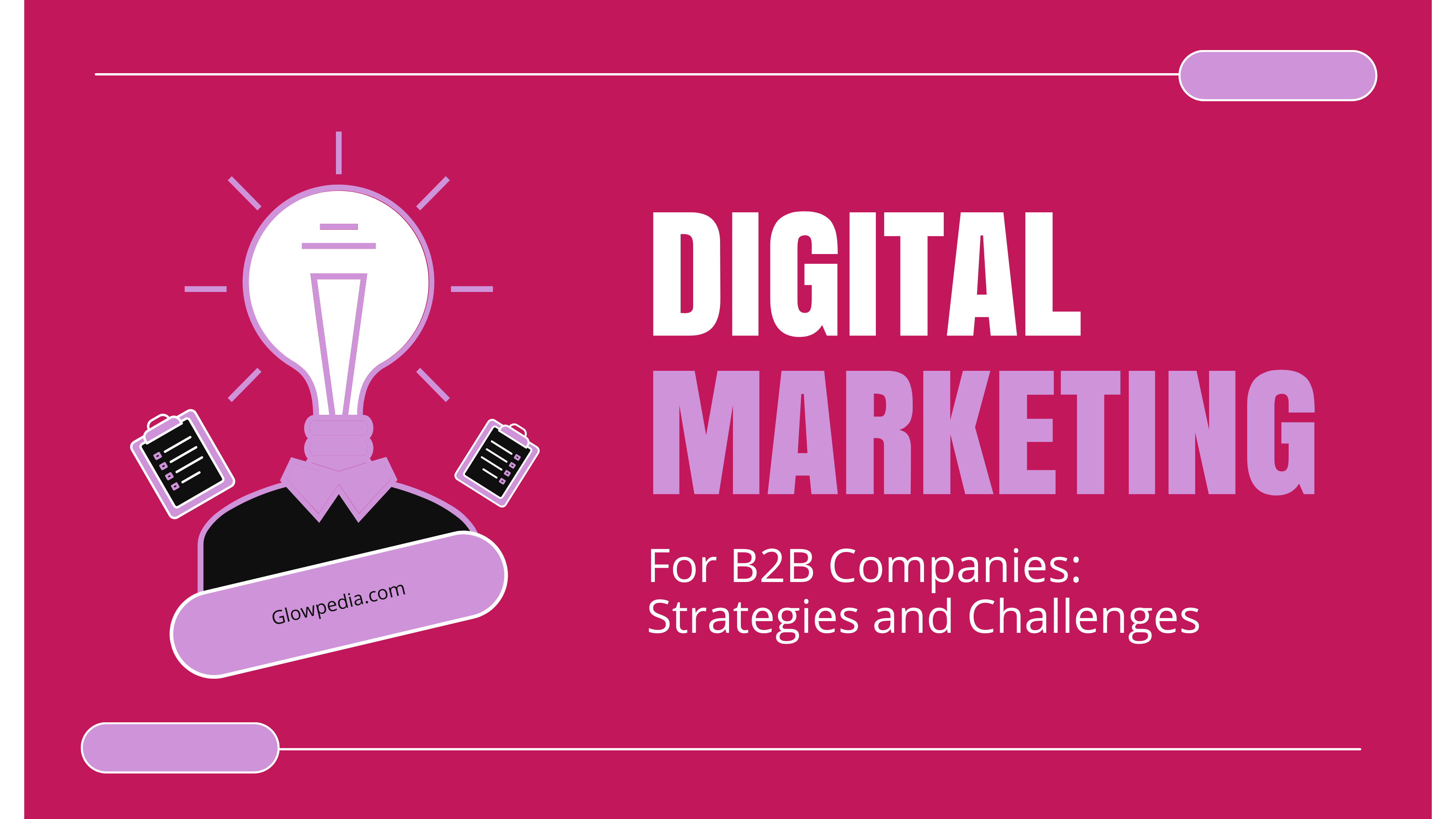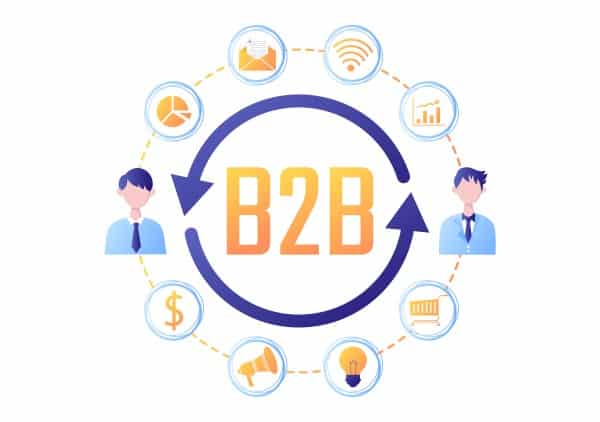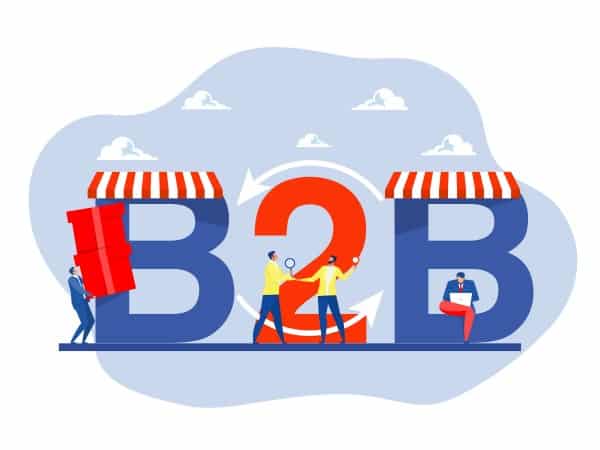In the rapidly evolving landscape of modern business, digital marketing has emerged as a cornerstone for success. This holds for B2C (business-to-consumer) companies and B2B (business-to-business) enterprises. While B2B marketing may seem distinct from its consumer-focused counterpart, the principles of digital marketing can be effectively applied to B2B scenarios with specific tailored strategies and unique challenges.
In this article, we delve into the world of digital marketing for B2B companies, exploring the strategies that work and the challenges that must be overcome.

The Essence of Digital Marketing for B2B Companies
B2B companies operate within a dynamic ecosystem that demands robust strategies to foster brand visibility, generate leads, and establish lasting relationships. The traditional methods of B2B marketing, such as cold calling and trade shows, have given way to digital avenues that offer unprecedented reach and precision targeting. Here are some key strategies that B2B companies can leverage within the realm of digital marketing:
Content Marketing: Sharing Knowledge to Build Trust
Creating and distributing valuable content is at the core of B2B digital marketing. High-quality blog posts, whitepapers, case studies, and videos demonstrate industry expertise and provide solutions to the challenges faced by potential clients. The focus here is on educating and assisting rather than directly selling.
Effective content marketing establishes the B2B company as a thought leader and helps in SEO (Search Engine Optimization), driving organic traffic to the website. Identifying the target audience’s pain points and information gaps and addressing them through content is crucial.

SEO and Organic Traffic: Being Discoverable
Search engine optimization is pivotal in making a B2B company discoverable online. Ranking higher in search engine results for relevant keywords ensures potential clients find your business when actively seeking solutions. This involves on-page SEO techniques, creating keyword-rich content, optimizing meta tags, and providing a user-friendly website structure.
However, B2B SEO often comes with challenges due to the technical and complex nature of many B2B products and services. Balancing technical jargon with user-friendly content is a fine line that must be carefully navigated.
Social Media Marketing: Building Relationships
Social media platforms offer B2B companies the opportunity to connect with their target audience more personally. While platforms like LinkedIn are naturally suited for B2B marketing due to their professional nature, other media can also be leveraged creatively. Sharing industry insights, company updates, and engaging content helps build brand loyalty and nurture relationships.
Email Marketing: Nurturing Leads
Email marketing remains a potent tool for B2B companies to nurture leads. Creating segmented email lists based on the buying cycle stage and sending relevant, targeted content helps keep prospects engaged. However, the challenge lies in crafting compelling emails that cut through the clutter of crowded inboxes and provide genuine value.
PPC Advertising: Targeting the Right Audience
Pay-per-click (PPC) advertising allows B2B companies to target specific demographics, industries, and job titles. This precision targeting ensures that your ads are seen by those most likely to be interested in your offerings. Platforms like Google Ads and LinkedIn Ads are commonly used for B2B PPC campaigns.
Challenges in B2B Digital Marketing
While the abovementioned strategies hold great promise, B2B digital marketing has its share of challenges. These challenges require a nuanced approach to ensure success:

1. Longer Sales Cycles and Complex Buyer Journeys
B2B sales cycles are often longer and more complex compared to B2C sales. This is due to the involvement of multiple decision-makers, extensive research, and higher financial stakes. B2B digital marketing strategies must accommodate this reality by providing content that addresses different stages of the buyer journey.
2. Building Personal Connections
B2B transactions are built on relationships and trust. Establishing personal connections in the digital realm can be challenging. Strategies like personalized email marketing and engaging on social media in a genuine, human way can help bridge this gap.
3. Data Privacy and Security Concerns
B2B transactions frequently involve the exchange of sensitive information. This places a premium on data privacy and security. B2B companies must assure their clients that their information is safe and implement necessary measures to protect data.
4. Content Relevance and Quality
B2B audiences are discerning. They require content that is not only relevant but also of high quality. Balancing the technical aspects of B2B offerings with accessible and engaging content can be challenging.
5. Measuring ROI
Measuring the return on investment (ROI) of B2B digital marketing efforts can be intricate. Unlike B2C transactions that often result in direct sales, B2B conversions might involve various touchpoints and interactions. Implementing proper tracking mechanisms and attributing value to different touchpoints is crucial.
6. Competition and Differentiation
B2B markets can be highly competitive. Standing out amidst competitors offering similar products or services requires a unique value proposition and a well-defined branding strategy.
Parting Words
B2B companies must embrace digital marketing strategies to remain relevant and competitive in the digital age. By understanding the distinct needs of their target audience and tailoring their approach to address these needs, B2B enterprises can forge meaningful connections, generate leads, and ultimately drive growth. While challenges certainly exist, they are not insurmountable. With a keen understanding of the landscape and a commitment to innovation, B2B companies can adapt, overcome challenges, and thrive digitally.

